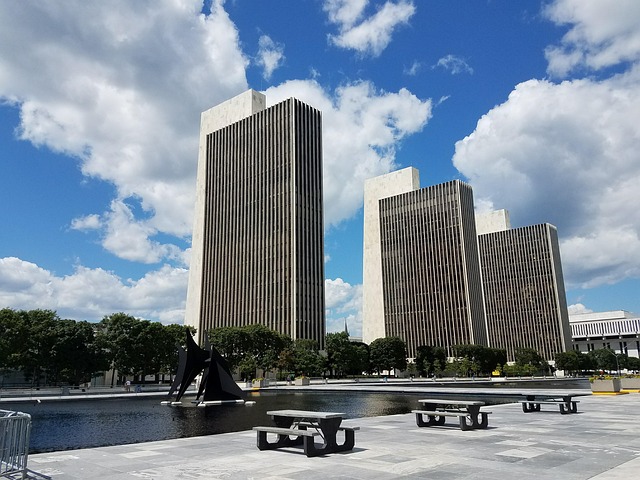Asphalt paving in Albany, NY, requires careful planning and precision, with timelines varying based on project size and weather. The process begins with preparation, including permits and design, followed by excavation and base layer setup. Key steps involve hot mix asphalt delivery, compacting, and leveling, with quality assurance checks at each stage to meet industry standards. Post-paving maintenance, like prompt cleaning and crack repair, ensures the longevity of Albany's paved surfaces. A well-planned timeline accounts for weather delays, guaranteeing durable road conditions that enhance city mobility and safety.
“Unleash the Transformative Power of Asphalt Paving in Albany! This comprehensive guide navigates your journey from initial design to final completion. Discover the intricacies of asphalt, its materials, and techniques that shape durable surfaces. Learn how to plan your paving project, secure permits, and create a seamless design tailored to Albany’s needs.
Explore the step-by-step timeline, ensuring quality assurance for a long-lasting pavement. Uncover post-paving care secrets to preserve your new surface. Get ready to transform spaces into vibrant, functional areas with expert paving services.”
- Understanding Asphalt Paving: Materials and Techniques
- Planning Your Paving Project in Albany: Permits and Design
- The Step-by-Step Paving Project Timeline
- Quality Assurance: Ensuring a Durable Pavement Surface
- Post-Paving Care and Maintenance Tips for Longevity
Understanding Asphalt Paving: Materials and Techniques

Asphalt paving is a multifaceted process that involves careful selection of materials and precise application techniques to create durable, resilient surfaces. The foundation of any successful paving project lies in understanding the components and methods behind this versatile material. Asphalt, the main constituent, is a mixture of petroleum-based binders, fine aggregates, and mineral fillers. This compound is known for its flexibility and strength, making it suitable for various applications, from residential street repaving timelines to commercial parking lot construction.
The paving project timeline in Albany varies based on several factors, including the scope of work, weather conditions, and material availability. However, a general resilient pavement construction calendar can guide homeowners and contractors. Preparation, such as utility location marking and surface removal, typically takes 1-2 days. The actual pouring and compacting process can be completed within 24-48 hours for smaller projects. For larger areas, the timeline may extend slightly due to material drying times and potential weather delays. Timely completion of concrete pouring is crucial for ensuring a robust and long-lasting pavement surface that can withstand traffic for years to come.
Planning Your Paving Project in Albany: Permits and Design

Before beginning your paving project in Albany, it’s crucial to plan and prepare. The first step is to obtain any necessary permits from local authorities, ensuring your project complies with regulations. This process can take time, so allowing sufficient lead-in for permit applications is essential. Once approved, careful design considerations will impact the overall project timeline and long-term pavement sustainability.
Think beyond just the immediate scope of your residential street repaving or pave lot project. Consider future needs and traffic patterns to create a design that serves both current and anticipated demands. This strategic approach ensures realistic pave lot completion time expectations while also promoting efficient use of materials, potentially reducing long-term maintenance costs.
The Step-by-Step Paving Project Timeline

A typical paving project timeline in Albany starts with preparation and planning. This involves assessing the site, obtaining necessary permits, and designing the layout according to client specifications. Once approved, the next step is excavation, where the old pavement is removed, and the base layer is prepared. This stage is crucial for ensuring a solid foundation for the new pavement. After the base is ready, the installation of subbase material and drainage systems (if required) takes place, providing additional support and preventing water damage.
The actual paving process begins with the delivery and spreading of hot mix asphalt. This is followed by compacting and leveling to create a smooth surface. For residential driveway paving time frames, this stage might involve specialized equipment for intricate designs or patterns. Efficient sidewalk resurfacing in Albany can be completed promptly, enhancing aesthetics and safety. Subsequently, an asphalt overlay installation may be performed to provide added protection and extend the life of the pavement, all done within carefully planned time frames.
Quality Assurance: Ensuring a Durable Pavement Surface

Quality Assurance is a cornerstone in professional asphalt paving services, ensuring that each project meets or exceeds industry standards and customer expectations. It involves rigorous testing and inspection at every stage of the paving process, from base preparation to final sealing. This meticulous approach guarantees a durable pavement surface that can withstand heavy traffic, extreme weather conditions, and the natural aging process.
In Albany, where unpredictable weather patterns can cause delays in paving projects, resilient pavement construction is crucial. A well-planned paving project timeline considers potential weather delays, incorporating buffer time into the calendar for smooth completion. By adhering to these practices, paving contractors ensure that residents and businesses in Albany receive high-quality, long-lasting road surfaces, enhancing safety and improving overall mobility throughout the city.
Post-Paving Care and Maintenance Tips for Longevity

After a successful paving project, maintaining your new or resurfaced asphalt is crucial to ensure longevity and preserve its quality. The first few months are critical, as proper care can significantly impact the overall lifespan of the pavement. One essential tip is to avoid excessive water exposure; while rain is natural, quick drying is key. Using sand or gravel as a fill material between pavers or cracks can help with drainage, preventing water from pooling and potentially causing damage.
Regular cleaning is another vital step in post-paving care. Removing oil, dirt, and other debris promptly prevents them from embedding into the surface, which could lead to staining or more severe damage. A local asphalt specialist can advise on suitable cleaning methods and products for your specific paving project timeline in Albany. Additionally, monitoring for cracks or uneven surfaces and addressing them promptly is cost-effective concrete slab laying that ensures your investment remains protected throughout its service life.
When it comes to your paving project timeline in Albany, understanding the process from start to finish is key. From material selection and design planning to quality assurance and post-paving care, each step contributes to a durable and long-lasting pavement surface. By following these guidelines and working with professional asphalt paving services, you can ensure your Albany paving project is a success, providing years of smooth driving and minimal maintenance.














